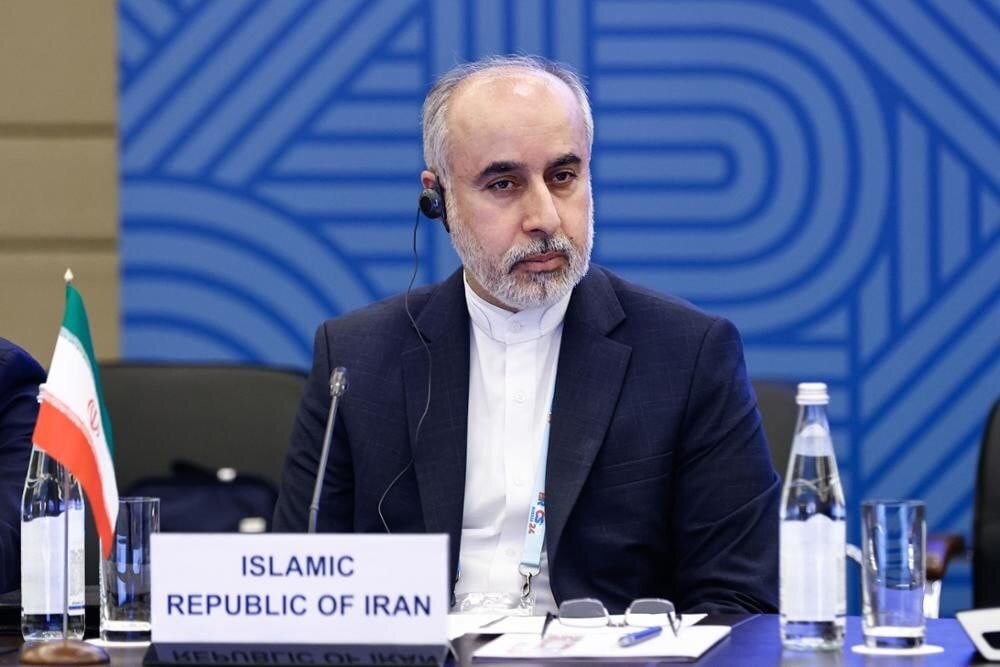Iran proposes strategic media collaborations at BRICS spokespersons summit

TEHRAN – Nasser Kanaani, the spokesperson and head of the Public Diplomacy and Media Center of Iran's Foreign Ministry, has outlined Iran’s proposals for enhancing the role of BRICS member countries in the media and information sector.
His proposals aim to foster a just and multipolar world, addressing the heads of information departments and spokespersons of BRICS foreign ministries during a key summit held in Moscow on Friday.
Kanaani’s presentation focused on several key areas crucial to the summit's agenda. He stressed the importance of collective actions by BRICS media to elevate the international standing of the group. Among the strategic initiatives discussed were efforts to deepen relationships among national media of BRICS countries, the creation of a common information framework, and the utilization of digital diplomacy and artificial intelligence in public diplomacy and foreign policy. Furthermore, he emphasized the necessity of combating fake news and misinformation.
Central to Kanaani’s proposals was the establishment of a BRICS Information Network. This network would serve as a platform for the dissemination and exchange of information among member countries, enhancing communication and collaboration.
Kanaani highlighted several functions this network could perform. It would help counter efforts against the free media activities of BRICS countries by Western powers, combat misleading and fake news campaigns, and address the negative impacts of unilateral sanctions and coercive measures. By highlighting the various effects of sanctions, particularly on human rights, the network could serve as a vital tool for member countries.
Further elaborating on his points, Kanaani stressed the necessity of strengthening media coordination and cooperation among BRICS members. He proposed connecting the information and news networks of member countries and creating mechanisms for sharing news in areas of mutual interest. This enhanced coordination would ensure a robust and united media front.
Kanaani underlined that media diplomacy has become an integral part of diplomatic activities. He described media as the most powerful tool for diplomats to disseminate their countries' views, messages, and positions. Reflecting on historical shifts, he noted that while dominant powers once relied on military force and coercive actions to achieve their goals, today’s battles are fought in the realm of media and virtual networks. These tools aim to capture the hearts and minds of audiences through messages rather than force.
Criticizing Western media, Kanaani pointed out that they often create false campaigns to mislead public opinion. He asserted that BRICS member countries can enhance multilateralism and counter Western media's unilateralism by deepening media relations and leveraging media and digital diplomacy capabilities. This strategy would help combat destructive media trends and promote a balanced global narrative.
In another part of his speech, Kanaani emphasized the importance of establishing a "cycle of media flow and prominence." This concept is crucial for achieving media justice and integrity, promoting multilateralism, and creating a free, fair, and constructive media environment.
Kanaani also addressed the meeting’s agenda concerning the creation of joint mechanisms to utilize the media capabilities of BRICS countries. He proposed that joint actions in promoting the goals and media coverage of the next BRICS summit in Kazan, Russia, could serve as a practical exercise in mobilizing members' media capacities toward shared objectives.
Concluding his address, Kanaani highlighted Iran's readiness to contribute to BRICS's international standing. He stated that as a leading country in media development in the West Asia region, the Islamic Republic of Iran is prepared to participate actively in this collective effort, leveraging its substantial media capabilities.
The meeting focused on creating practical coordination and deepening cooperation among Media of BRICS member states. The use of digital diplomacy tools for foreign policy was also discussed, according to the Foreign Affairs Ministry.
The meeting held at the Presidency of the Spokesperson of Russian Ministry of Foreign Affairs, Maria Zakarova, the Spokespersons and Head of Information Departments of Ministries of Foreign Affairs agreed to create coordination on setting narratives and linking national media for advancing the agenda of BRICS member states to the local and global media.
Iran officially joined BRICS at the beginning of this year, following its acceptance as a full member alongside Argentina, Egypt, Ethiopia, the UAE, and Saudi Arabia.
The BRICS group, initially comprising Brazil, Russia, India, China, and South Africa, now represents approximately 40% of the global population and a quarter of the world’s gross domestic product (GDP). Iran was one of many countries that sought membership in BRICS and submitted a formal application to join the organization.
